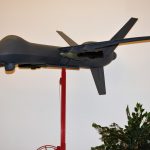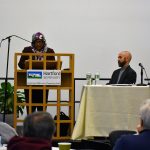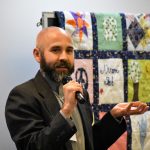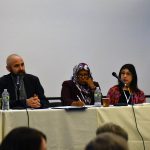The Interfaith Conference on Drone Warfare was held at Hartford Seminary on Wednesday, March 14, co-sponsored by the Seminary and the Interfaith Conference on Drone Warfare. The conference explored why many people of faith believe that lethal drones should be limited or their use ended.
Presenters included: Andrea Prasow, Associate Director of the Washington Office of Human Rights Watch; Dr. Maryann Cusimano Love, Politics Department, Catholic University, Washington, DC; the Rev. Dr. Chris Antal, Unitarian Universalist Minister, resigned as an army chaplain because of the U.S. lethal drone policy; and Lt. Colonel Shareda Hosein (U.S. Army Reserves Retired).
Video of the talks by the Rev. Dr. Chris Antal and Lt. Colonel Shareda Hosein, both Hartford Seminary graduates, can be viewed here.
Two films produced by the Interfaith Network on Drone Warfare for congregations were also screened: Moral and Safe? War, Peace, Drone Warfare and the Religious Community and a 30-minute version of the documentary, National Bird. Information about the films can be found at www.interfaithdronenetwork.org.
During the conference, several concerns were expressed about lethal drones, including:
- Because lethal drones are so easy and cheap to use, it is tempting to expand warfare into non-war zones thereby increasing the likelihood that the U.S. will resort to war.
- Though it is possible to kill terrorist leaders with lethal drones, drones cannot kill an extremist movement. In fact, the opposite is likely – drone attacks increase the determination of the terrorist and increases the number of extremists. There is an expression that says “Kill a terrorist; create ten more.” Drones do not kill violent ideology; they generate hatred and mistrust of America.
- Though the number of civilian casualties, including children, may be smaller than those resulting from the use of other weapons, the weapon is not as precise as the government claims. As of 2013, Senator Lindsay Graham (R – SC) indicated that there were 4,700 civilians killed as a result of drone warfare.
- Drones are proliferating. More than 80 countries currently have lethal drones. It is increasingly likely that lethal drones will be used against the U.S. The world urgently needs strong international agreement banning or limiting the use of lethal drones.
- The use of drones is not transparent. The U.S. government has kept much of this program secret. There is a disconnection between what Americans know and what the government is doing. It is difficult for Americans to publicly criticize drone warfare because they have very little information. When information has been made public because of litigation, policies have changed.
- The use of drones directly harms attempts to promote human rights and the rule of law by violating international human rights law.
- Terrorist groups, like ISIS, now use lethal drones.
- Though drone operators cannot be killed or wounded, they are often damaged psychologically and some have been diagnosed with Post Traumatic Stress Disorder (PTSD).













 Sign-up now ›
Sign-up now ›